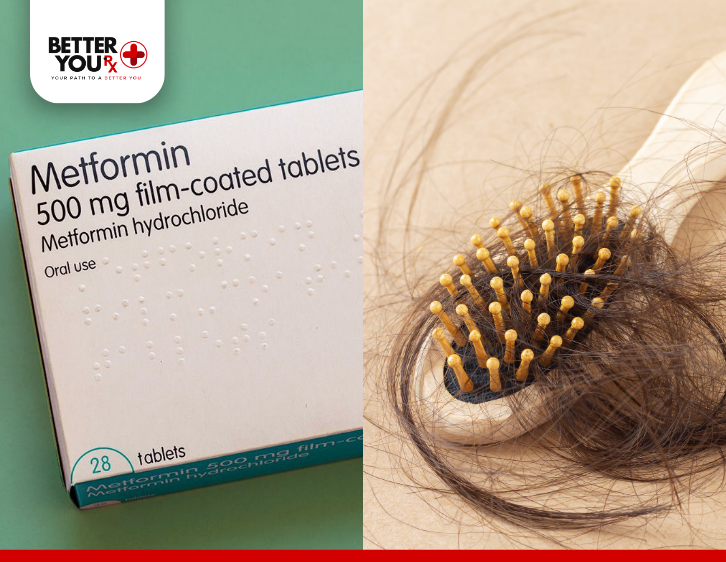Metformin, a common medication used to manage type 2 diabetes, has been widely studied for its effects on blood sugar regulation and its role in treating conditions like polycystic ovary syndrome (PCOS). However, patients taking this drug sometimes report experiencing hair loss, prompting questions about its potential side effects. In this article, we’ll explore whether metformin can cause hair loss, the factors involved, and possible remedies to address the issue. Additionally, we will examine the connection between vitamin B-12 deficiency, a common concern for metformin users, and hair health.
What Is Metformin? Metformin is an oral medication primarily used to treat type 2 diabetes. It works by reducing the amount of glucose produced by the liver and enhancing the effectiveness of insulin, helping to control blood sugar levels. It’s also used in the treatment of PCOS, a hormonal disorder that can lead to irregular periods and fertility issues. While metformin is generally well-tolerated, some individuals report side effects, including gastrointestinal issues, and in rare cases, hair loss.
Does Metformin Directly Cause Hair Loss?
There is limited scientific evidence linking metformin directly to hair loss. Although hair loss is not officially listed as a common side effect, some people on metformin have reported thinning or shedding hair. However, these cases are rare, and there’s no definitive study that establishes a direct cause-and-effect relationship between the drug and hair loss.
In a few isolated cases, individuals with type 2 diabetes who were taking metformin alongside other medications, like sitagliptin, experienced hair loss, including eyebrow and eyelash thinning. While this might suggest a potential medication-related side effect, it is not conclusive. There may be other contributing factors, such as underlying conditions, genetics, or other medications.
Could Vitamin B-12 Deficiency Be the Culprit?
A 2013 study indicated that long-term metformin use could lead to a reduction in vitamin B-12 and folate levels in the body. Vitamin B-12 deficiency can manifest in various ways, including hair loss, fatigue, and weakness. If you are taking metformin and experiencing hair loss, it’s worth considering whether low vitamin B-12 levels could be contributing to the problem.
In some cases, metformin users who are not supplementing their diet with sufficient B-12-rich foods may face deficiency-related hair loss. It’s essential to consult with your healthcare provider to monitor your vitamin levels and, if necessary, adjust your diet or take supplements. Foods rich in B-12 include beef, fish, eggs, and dairy products, and your doctor may recommend a B-12 supplement if needed.
Other Contributing Factors to Hair Loss
Even if metformin itself isn’t causing hair loss, several factors related to diabetes and the conditions treated by metformin may contribute to hair thinning or shedding:
- Stress: Diabetes and PCOS can cause emotional and physical stress, which can trigger temporary hair loss. Stress is known to disrupt the normal hair growth cycle, leading to conditions like telogen effluvium, where hair sheds more than usual.
- Hormonal Changes: Diabetes, especially when poorly controlled, and PCOS can lead to hormonal imbalances that affect hair growth. PCOS, in particular, is known to cause thinning hair as a result of elevated androgen levels (male hormones).
- Hyperglycemia: High blood sugar levels, a hallmark of uncontrolled diabetes, can damage blood vessels over time, reducing oxygen and nutrient delivery to hair follicles, which may impair hair growth.
What Are the Remedies for Hair Loss Associated with Metformin?
If you suspect that metformin or a deficiency in vitamin B-12 is contributing to your hair loss, there are several steps you can take to manage the situation:
- Consult Your Doctor: If you notice hair thinning or excessive shedding, it’s crucial to talk to your healthcare provider. They can help identify whether metformin, vitamin deficiencies, or other health conditions are the root cause. Based on your diagnosis, they might suggest a change in medication or lifestyle adjustments.
- Ensure Adequate Nutrition: If your hair loss is related to vitamin deficiencies, particularly B-12, consider adding more B-12-rich foods to your diet or taking supplements as recommended by your doctor. Other essential nutrients for hair health include zinc, iron, and protein.
- Manage Stress: Stress management techniques like exercise, meditation, and hobbies can help reduce the impact of stress on hair loss. Find activities that relax your mind and improve overall well-being.
- Avoid Traumatic Hair Practices: Tight hairstyles, such as ponytails or braids, can exacerbate hair loss. Avoid excessive use of heat treatments or harsh chemicals that might damage your hair further.
- Consider Hair Growth Treatments: Some topical treatments, like minoxidil (Rogaine), have been shown to promote hair regrowth. However, you should consult with your doctor before starting any new hair treatments, especially if you’re already managing diabetes or PCOS.
When to See a Doctor
Hair loss can be a sign of an underlying condition that requires medical attention. If your hair is thinning, breaking, or falling out rapidly, or if you’re experiencing stress due to hair loss, it’s time to schedule an appointment with your doctor. Early intervention can help address any underlying health concerns and prevent further hair loss.
Seek immediate medical attention if:
- Your hair loss is sudden or occurs rapidly.
- Hair loss is causing emotional distress.
- You notice other unusual symptoms alongside hair thinning.
Takeaway
While metformin is not typically associated with hair loss, the underlying conditions it treats—type 2 diabetes and PCOS—can sometimes contribute to hair thinning. Additionally, long-term use of metformin may lead to vitamin B-12 deficiency, which can also result in hair loss. By working with your healthcare provider, monitoring your blood sugar levels, managing stress, and ensuring proper nutrition, you can address the potential causes of hair loss and maintain healthy hair growth. If you’re experiencing persistent hair issues, make sure to consult with your doctor to determine the best course of action for your specific situation.




